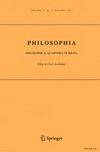形而上学的因果多元论:新机械论的多元论是关于什么的?
IF 0.5
4区 哲学
0 PHILOSOPHY
引用次数: 0
摘要
虽然科学哲学中关于多元主义问题的文献非常广泛,但本文主要关注从因果关系的新机械论讨论中产生的形而上学因果多元主义。主要目的是将关于因果关系的新机械论观点置于Psillos(2009)所构建的各种因果多元主义的解释中。注意他关于因果关系的形而上学观点的分类(即:紧张衣观、功能观、双概念观、不可知论观和无神论观)将有助于澄清意见的分歧,同时,使阐明新机械论辩论中存在的主要形而上学论点成为可能。特别注意的是S.格伦南的因果理论,因为它是独特的,提供了一个整体的形而上学的观点的问题。也有人认为机械论者在因果关系上不是“无神论者”:虽然他们都是因果实在主义者,但大多数机械论者在因果关系上是“不可知论者”,只有少数例外,如S. Glennan, P. Machamer和J. Bogen。本文章由计算机程序翻译,如有差异,请以英文原文为准。
Metaphysical Causal Pluralism: What Are New Mechanists Pluralistic About?
Abstract Although the literature on the issue of pluralism within the philosophy of science is very extensive, this paper focuses on the metaphysical causal pluralism that emerges from the new mechanistic discussion on causality. The main aim is to situate the new mechanistic views on causation within the account of varieties of causal pluralism framed by Psillos (2009). Paying attention to his taxonomy of metaphysical views on causation (i.e., the straightjacket view, the functional view, the two-concept view, the agnostic view and the atheist view) will help clarify differences in opinion and, at the same time, make it possible to elucidate the main metaphysical theses present within the new mechanistic debate. Special attention is given to S. Glennan’s theory of causation, since it is unique in offering an overall metaphysical view of the issue. It is also argued that mechanists are not “atheists” on causation: while all of them are causal realists, most mechanists are “agnostic” on causation, with a few exceptions such as S. Glennan, P. Machamer and J. Bogen.
求助全文
通过发布文献求助,成功后即可免费获取论文全文。
去求助
来源期刊

PHILOSOPHIA
PHILOSOPHY-
CiteScore
0.90
自引率
20.00%
发文量
141
期刊介绍:
Founded in 1971, Philosophia is a much-respected journal that has provided a platform to many well-known philosophers, including Kenneth Arrow, A.J. Ayer, Roderick Chisholm, Bas van Fraassen, William Frankena, P.T. Geach, Alan Gewirth, Jaakko Hintikka, Richard Popkin, W.V.O. Quine, Gilbert Ryle, Marcus Singer, Peter Singer, J.J.C. Smart, P.F. Strawson, and many others. Philosophia also published papers of Ludwig Wittgenstein and Rudolf Carnap.
Philosophia is an international journal in scope, submissions and readership. The journal publishes contributions fitting within various philosophical traditions, but manifests a preference of the analytic tradition in the broad sense of commitment to clarity and responsibility.
Besides papers in the traditional subfields of philosophy and its history, Philosophia also publishes work on topical subjects such as racism, silence of God, terrorism, the nature of philosophy, emotion, AIDS, scientific discovery, punishment, modality, and institutional theory of art.
Philosophia welcomes a wide range of contributions to academic philosophy, covering all fields of philosophy. Contributions to the journal may take the form of topical papers, philosophical surveys of literature, symposia papers, short discussion notes, puzzles, profiles, book reviews and more extensive critical studies of new books. The journal includes a ''books revisited'' section where a book and its impact are reconsidered a decade or more after its appearance. Double-blind review procedure The journal follows a double-blind reviewing procedure. Authors are therefore requested to place their name and affiliation on a separate page. Self-identifying citations and references in the article text should either be avoided or left blank when manuscripts are first submitted. Authors are responsible for reinserting self-identifying citations and references when manuscripts are prepared for final submission.Please read our Editorial Policies carefully before you submit your paper to this journal https://www.springer.com/gp/editorial-policies
 求助内容:
求助内容: 应助结果提醒方式:
应助结果提醒方式:


